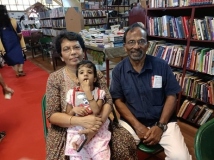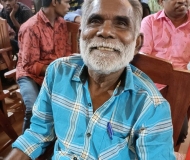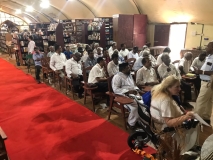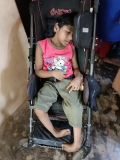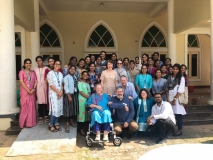Disability inclusion framework ABC: Spring 2024 Vital Link Newsletter
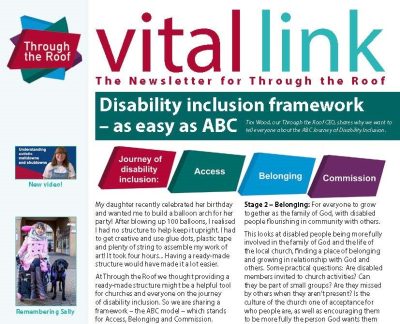
Welcome to the Spring 2024 Vital Link newsletter from Through the Roof.
Download your copy to:
- read all about our new framework: the ABC Journey of Disability Inclusion, and how to apply it in your church
- watch our new video 'Understanding autistic meltdowns and shutdowns' and share it with others
- meet our new Chair of Trustees, Trevor Hahn, as he celebrates the ministry, witness and life of former Chair, Mike Townsend
- read the life-changing stories of Saroop and Jerome, from our recent International Roofbreaker mission trip to Kerala, India
- be reminded that you only need to 'Ask and you shall receive', and that fundraising doesn't need to be complicated
- and much more...
-
-
-
-
-
- Follow this link to download the PDF of the Vital Link SPRING 2024 newsletter
- Or contact us on 01372 749955 or email info@throughtheroof.org to request a different accessible format
- Or read Vital Link onscreen with the Joomag viewer below:
Open publication - Free publishing -
-
-
-
Book review: Loving Our Own Bones
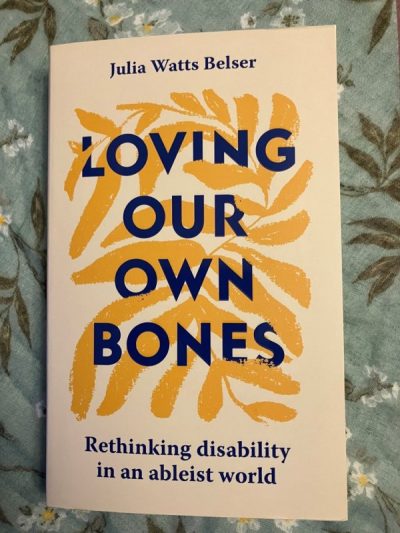
Becky Clegg, a Roofbreaker with personal experience of disability, reviews 'Loving Our Own Bones: Rethinking disability in an ableist world' by Julia Watts Belser
In her latest book, 'Loving our Own Bones', Watts Belser offers a glimpse into disability, aiming to address key questions of inner life and spirituality. She draws some fascinating insights from scriptures that may not be the first to come to mind when grappling with theology through the lens of disability. In this respect, her biblical explorations are quite refreshing and will be my focus here. However, readers should be aware of Watts Belser’s background as a Jewish rabbi, where the need for Jesus as the promised Messiah is overlooked.
God on wheels
'Loving our Own Bones' opens with a rather picturesque account of daily life and getting around with a disability. Seeing her walking gait as having a ‘distinctive rhythm’ had me smiling in recognition. Others may appreciate the tangible ‘wheels rolling over tarmac’. This leads into Watts Belser’s notion of ‘God on Wheels’, born of her identification with Ezekial’s vision of God appearing ‘on a vast chariot, lifted up by four angelic creatures with fused legs, lustrous wings, and great wheels’. God is seen as identifying with the joys and freedom of freewheeling, as well as the pains and frustrations of negotiating obstacles along the way; (obstacles being the disabling factor, not impairment itself, according to the social model of disability highlighted here).
With the final chapter of 'Loving our Own Bones' also devoted to ‘God on Wheels’, Watts Belser speculates on God’s own body. It may seem fair enough that this line of thought is based on the biblical concept of everyone being born in God’s own image. However, trying to humanise God dismisses God’s omnipresence and divinity which spans beyond any human understanding. At least one paragraph is a direct repetition of one found in the opening chapter. It is beautifully descriptive and underlies Watts Belser’s enthusiasm for the concepts, but also shows that there is only so far one can go when limiting God to human understanding.
Wrestling with disability in the Old and New Testaments
Notwithstanding, readers will likely resonate with issues that Watts Belser draws on from following key Old Testament characters. Moses’s bargaining with Pharaoh (to free the Israelites from Egypt) was hesitant on account of his speech impairment, which seems reasonable to me as someone who shares this disability. However, Moses is then equipped just as God needed him to be. I say needed, as it is then suggested that God needed Moses to fulfil this rescue plan. This may be so, but the passage shows how God crafts His plan and who He has chosen to carry out His mission. Watts Belser helpfully quotes the verses to say that it is all the Lord’s doing. Additionally, God has already ensured Moses will be supported. Not only is Aaron prime candidate as his brother’s spokesperson; their intimate connection is foreseen to provide moral support. Yes, relying on support can be frustrating if it goes wrong, as the text explores, but this interdependence is a helpful picture of what God intended for his church.
Turning to the New Testament, we see the account in Luke's Gospel of the woman enduring eighteen years of bent posture and pain. Here, the contentious issue of healing is laid bare. Whatever your personal stance, Watts Belser’s focus on the woman’s anonymity seems to be a vehicle for her frustration with ‘overcoming disability’ headlines.
Watts Belser’s critical approach in 'Loving our Own Bones' also shows in her ‘hatred’ of the story of Isaac’s blessing getting mixed up between his sons Jacob and Esau. Isaac is subjected to expectations of disabled people working around their impairments. Her assertion that this story ‘gets disability wrong’ suggests Watts Belser’s limited understanding of the characters as individuals.
Clear acceptance and 'loving her own bones'
Watts Belser concludes her search for answers or healing with a clear acceptance of who she is meant to be, whatever the reason, and ‘loving her own bones’. There are many times when we will choose to share and educate, as Watts Belser does in many instances recorded here, but this is where we are personally guided. This may go some way to healing at a societal level, if the disabling obstacles lie within societal attitudes, Watts Belser argues.
In sum, in 'Loving our Own Bones', Watts Belser makes an impressive attempt to wrestle with a range of issues concerning disability and faith, with a deeply personal touch. You may identify with the amusing anecdotes of daily life littered through the text. However, the text does leave you wondering about Watts Belser’s exact relationship with God and what her purpose is here.
'Loving Our Own Bones' by Julia Watts Belser is published in the UK edition by Hodder & Stoughton (ISBN 9781399804240)
International Roofbreakers in Kerala, India, 2024
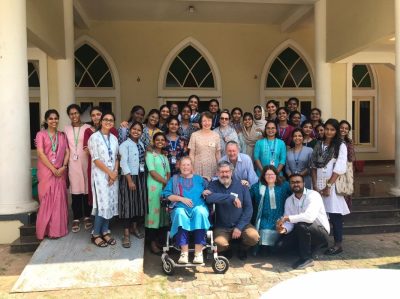
Our first International Roofbreaker mission trip to Kerala, India, in January 2024 had a profound impact. It touched the lives of at least 135 disabled people and family members. The trip also addressed the hearts and minds of over 200 local Christian leaders, teachers and students, giving them a more Biblical view of disability inclusion.
We were told that very often in India, disabled people are separated from the rest of society, and sadly most churches do not include any disabled people at all. The Kerala International Roofbreaker mission made an immediate difference to this situation.
A group of six team members from the UK visited Kerala and joined with local Christians from our partner organisation, Sathyam Ministries. The volunteers shared about the Biblical basis for valuing and including disabled people, and how this can be done in practice. The message was strengthened by the fact that the Roofbreaker team included UK volunteers who are disabled themselves. Many pastors from Kerala pledged to change things in their churches and to reach out to local disabled people.
International Roofbreakers missions provide pastoral support for the local disabled people who received wheelchairs and mobility aids the year before, in our Wheels for the World mission.
God has given us a vision for International Roofbreaker events to train and encourage local churches in developing countries to support and value disabled people in their communities. To do this, we invite local Christians to become International Roofbreakers, or disability champions, who break down barriers to full inclusion in church and Christian life.
In the blog posts below, Anne, a UK Roofbreaker, shares her experiences from the Kerala trip, and the many ways it encouraged local disabled people and educated the community.
Arrival in Kerala
"On the first day, we were invited by our host, Dr. CV, to a get-together, known as ‘Ability Meet.’ As soon as we arrived, we were greeted by a sea of smiling faces. A terrific welcome: everyone seemed pleased to see us and we were presented with flowers.
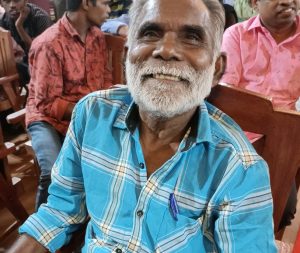 We were able to speak, through an interpreter, sharing a little about Through the Roof, and also to meet and chat with people. Some of those we met had been given wheelchairs from Through the Roof previously. A lovely man, with a terrific smile, disabled as the result of an accident, commented on how the gift of a wheelchair enabled his independence. He is also reading his Bible.
We were able to speak, through an interpreter, sharing a little about Through the Roof, and also to meet and chat with people. Some of those we met had been given wheelchairs from Through the Roof previously. A lovely man, with a terrific smile, disabled as the result of an accident, commented on how the gift of a wheelchair enabled his independence. He is also reading his Bible.
One particularly amazing granddad had enough English to tell me his granddaughter has an extra chromosome-18, a condition also known as Edward’s syndrome.
This granddad has a terrific faith. The doctors predicted that his granddaughter would only live for two years, but she is eight years old, and she is starting to talk and make progress. He gives God the glory.
He said ‘medical science can fail, but God doesn't fail – my granddaughter is alive because Jesus is alive’. He said she worships with them. He takes her everywhere, as a witness to the faith. This man and others were a real blessing to us."
Another packed but rewarding day
"Today we visited local people at home. All the families had a member who is a wheelchair user.
The first lady we saw is called Pennamma, she is 97 years of age. Martyn, our team leader remembers her from when she received her wheelchair from us on the Kerala Wheels for the World trip. Pennamma was using the wheelchair when we saw her. She spoke about having reached the age of 97 and being happy for God to call her home. Her favourite Bible passage is Psalm 23. The Lord is indeed our Shepherd and He has guided Pennamma through 97 years!
In the next home we visited, the family have a small boy called Aardhil. He was making good use of the wheelchair we previously gave him. The family said that the wheelchair acts as a ‘pacifier’, calming him when he is stressed. It also enables his brother, and the rest of the family, to take him for a walk in the local area.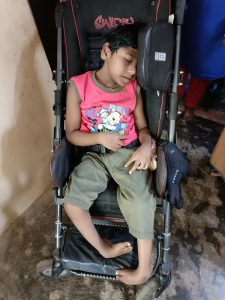
This little boy, Aardhil, has no sight. He had a cornea transplant operation recently, but this was not successful, and the family have asked for prayer. He has hearing and was able to respond to us by waving. He likes music and listens to Christian worship songs.
The main thing that has struck me, throughout the trip so far, is the level of care and support shown to each individual person by their families. It is very humbling. We hope to inspire the local community to offer support as well, so everyone can belong and play their part in life."
Inspiration from the young and old
𝗧𝗵𝗲 𝘁𝘄𝗼 𝗠𝗮𝗿𝘆𝗮𝗺𝗮𝘀
“Yesterday morning we met two elderly ladies, both named Maryama! They also both have a strong Christian faith. The simple faith of the people we have met has really touched us.
The first Maryama has a favourite Scripture passage: Psalm 91. She can't see to read, but the Bible passages are written in her mind and on her heart.
Eighteen years ago, this lady nearly died. The doctors told her to prepare for her death (literally they told her to buy a coffin). She had faith in God though, that it wasn't her time.
She didn't die and her daughter-in law, who cares for her, heard a voice from heaven saying 'You've got your Mother back, now care for her’, and she does.
The second Maryama has been bed-ridden for two months, due to diabetes. Sadly, she can't really use her wheelchair now, and finds it hard to praise God; I believe she still praises God, in her heart. One of our team sang a praise song to her – with actions! It lifted her spirits."
𝗛𝗼𝗺𝗲 𝗼𝗳 𝗛𝗼𝗽𝗲 𝗼𝗿𝗽𝗵𝗮𝗻𝗮𝗴𝗲
"In the afternoon, we visited the children's wards of an orphanage. It had beautiful gardens outside. We were all touched by the level of care given to these children by the nuns who run it. Many of the children have severe disabilities. Several children had received wheelchairs from Wheels for the World – many with decorations on. The wheelchairs had totally transformed their lives. They can sit up and look around for the first time.
The children were full of smiles. Several of the children sang for us. One blind girl had a little English. Another girl could point to India on a map and correctly identify an eagle in a book.
Tragically, these children are mainly unwanted by their parents. They were all friends, and they held hands. The orphanage touched the hearts of all of us." We pray the children will be blessed."
Local church leaders catch the vision
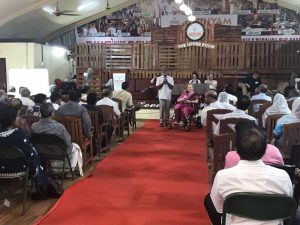 Our UK team leader Janet spoke, from John's gospel, explaining that disability is not a curse or a punishment from God for the individual’s sin or the sin of the parents. This is a common misconception here and may lead to disabled people being shunned within society. Martyn spoke on being adopted in God's family and Abigail sang and gave a word of testimony.
Our UK team leader Janet spoke, from John's gospel, explaining that disability is not a curse or a punishment from God for the individual’s sin or the sin of the parents. This is a common misconception here and may lead to disabled people being shunned within society. Martyn spoke on being adopted in God's family and Abigail sang and gave a word of testimony.‘We need to be like Jesus’
"This is our final blog, reflecting on our last day of Roofbreaker events, before our team day out to close the trip (to see more of Kerala with an enjoyable trip to the elephant sanctuary).
Yesterday, we were speaking again, to pastors, church leaders and Sunday school teachers. The meeting opened in prayer. Students from Justin's Home performed music for us again, singing and playing musical instruments. The meeting then began, as we discussed feedback from the previous day, and gave a response to some of people's questions. We read from the Bible: the ‘Good Samaritan’ and the ‘Sheep and the goats’.
Next, Jewels gave her testimony, explaining her lived experience as a disabled Christian. Afterwards, Abigail interviewed two local disabled Christians about their stories. They both enjoyed church, listening to testimonies, and praising God. Justin, Dr CV’s son, thanked God for his parents and siblings. Martyn spoke on ‘Glorifying God' and Janet talked more about what it means to be a Roofbreaker.
Finally, we asked a question: ‘After what you have heard over the past two days, what one thing will you implement, in order to show you include and value disabled people?'
People responded very well to the whole event. They commented that they particularly enjoyed Jewels’ testimony. One man mentioned that he had never thought about people with disabilities before, now he will. Several leaders said they are going to implement changes.
One very special attendee stood up at the end and gave a word of testimony. He has a hidden disability. The whole message, from us and our Indian brothers and sisters can be summed up in the words ‘We need to be like Jesus’."
Your support means so much
If you would like to get involved with International Roofbreaker missions through prayer or volunteering, visit our International Get Involved page. If you're interested in joining a trip (volunteers need to raise funds for their own costs and air fare) visit our Planned trips page or email Shaun@throughtheroof.org
Please consider donating funds to this Gospel-centred work: your support means so much to us and to the disabled communities in the developing countries we reach.
News release: Understanding autistic meltdowns and shutdowns video
Triona Brading, an autistic Christian who is a Roofbreaker disability champion with Through the Roof, has teamed up with the charity again for a second video: ‘Understanding autistic meltdowns and shutdowns.
Triona shares “helpful starting points for discussions with the autistic people in your church” to create awareness and begin dialogue, so autistic people can feel at home.
What does the video cover?
The new video explains the difference between two different responses an autistic person may have to feeling overwhelmed: an outward response (a meltdown) and an inward response (a shutdown).
It gives useful tips on how to prepare in advance for meltdowns and shutdowns, talking to autistic individuals before anything happens about what support or help they may want. It also covers what you could do if a meltdown or shutdown emotional response is already happening. For a run-time and content list, see the video description on YouTube at the video link here https://youtu.be/aDD8-exFb-s
Advice from Triona is: “If it’s possible, in the space that you have, and the setting that you’re in, you might want to think about a plan for if someone is experiencing a meltdown.”
A more inclusive church for autistic people
Church can be a difficult and confusing place for autistic people, but it doesn’t have to be that way. This video aims to help people in churches learn how to create a more inclusive church environment for autistic people, with practical tips and advice that can be easily and quickly implemented.
Triona, an advocate for making the church a more accessible place for autistic and neurodiverse people, released the video as the second in her series of Autism and neurodiversity videos for churches @TTRChangesLives on YouTube. The first in the series is called 'Supporting autistic individuals in our churches', and is available at the series link above.
“The best thing you can do is talk to autistic people you know that come to your church groups and services, and see what they would like in place.” Triona says.
Please watch, like and share the video
Send a positive message to autistic people in your community – watch, like and share the video in your church or community so everyone grows in understanding and can offer a truly accessible welcome for autistic people.
Through the Roof provides free support and resources through its Roofbreaker project to enable Christian disability inclusion. Find out more at: https://throughtheroof.org/forchurches/roofbreakers/


